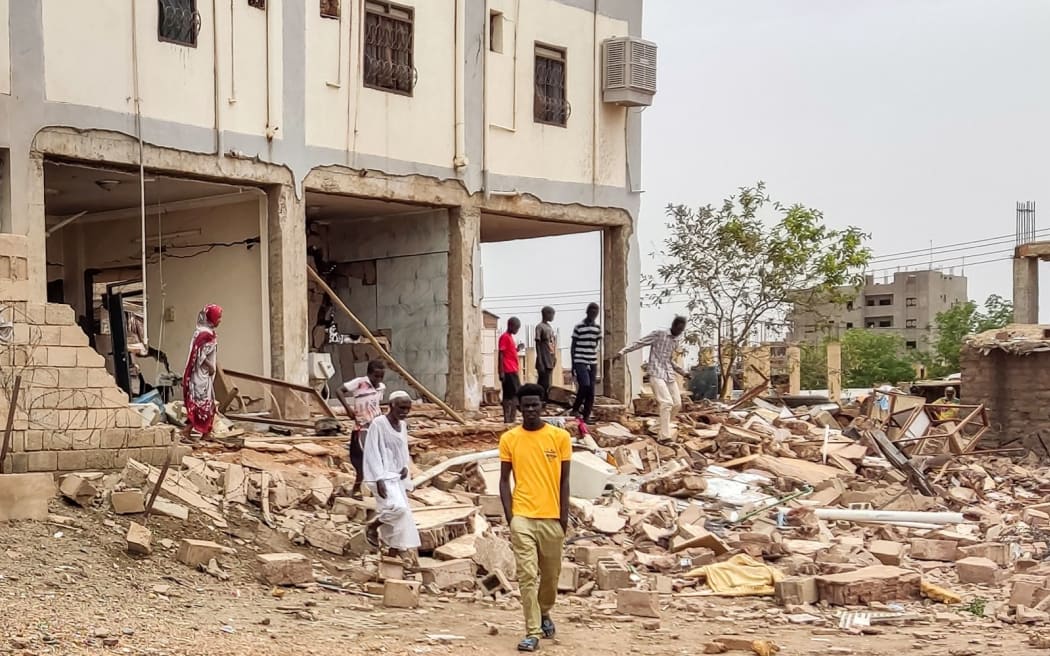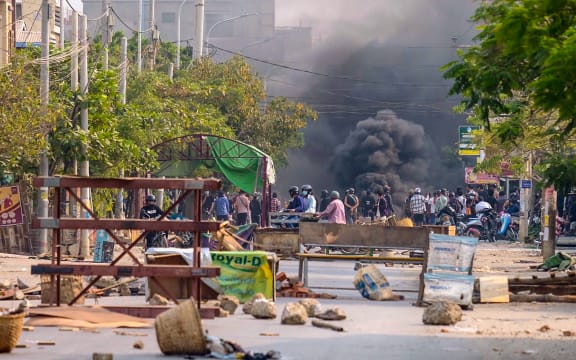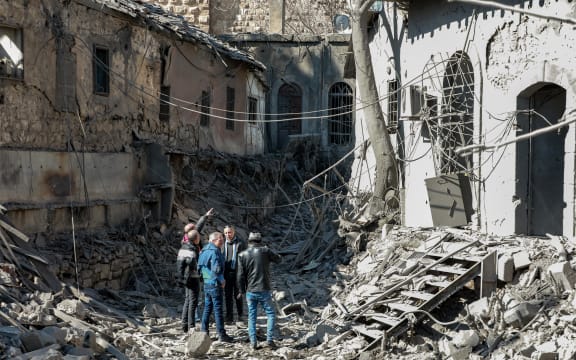Two years ago, Russia went to war with Ukraine. The fighting continues, but New Zealand has largely stopped watching.

People inspect the rubble at a house that was hit by an artillery shell in the Azhari district in the south of Khartoum on 6 June, 2023. Photo: AFP
This weekend will mark two years since Russia invaded Ukraine, beginning a war that has killed or wounded hundreds of thousands of people.
But for the past four months, reports from that war have slipped down our newsfeeds, replaced by news from Gaza and Israel. A few years ago, it was Afghanistan we watched, and before that Myanmar and Syria. Meanwhile, there are conflicts dotted around the rest of the world that rarely, if ever, make headlines.

Burning barricades in the distance during a crackdown by security forces on demonstrations against the military coup in Mandalay, Myanmar Photo: AFP / Facebook/ Anonymous source
"I think it's fair to say that the media ignores most conflicts in the world, most of the time," says Phil Vine, former producer and presenter of RNZ's World Watch.
Vine was responsible for deciding what news made it to RNZ's audience. He says he kept a close eye on the big networks, like BBC, Al Jazeera and CNN, to see what they were covering.
"You then have to work out the significance and the relevance to people in Aotearoa because that is really the fundamental part of your job, to reflect the world but through a New Zealand lens."
So what is it that makes a war relevant for a New Zealand audience?
"Proximity, geographically and culturally. So for better or worse a conflict in Europe will have more relevance culturally and politically than just about anywhere else, like Latin America or Africa," he says.
When a new conflict enters the news cycle, another will almost certainly get dropped.
"There's no doubt there's a cap to people's ability to empathise, and I guess that's just self-protection," says Vine. "We've got to choose between our suffering, which sounds really quite harsh but I think at a certain subliminal level that's what goes on."
The Detail also speaks to former Labour leader David Shearer, who has spent decades overseas working as a humanitarian, most recently as head of the United Nations Mission in South Sudan. Despite conflict being at the centre of his work, he too has a cap to how much he can handle.

People inspect damage in the aftermath of an air strike that hit Damascus, Syria on 19 February, 2023. Photo: AFP / Louai Beshara
"I can only listen to the news once a day," he says. "Otherwise I get terminally depressed about things."
In the world of international aid, Shearer says it's a combination of factors that impact which countries get attention. Most importantly is what he calls a country's "strategic position" -- that is, the country's value to big powers like the US, China and Russia - though this doesn't always stop countries from getting humanitarian aid.
"I will say that South Sudan, where I spent four and a half years, has maintained its levels of aid even though it could be argued that it doesn't really have a great deal of strategic relevance. There's no migrants coming through there, there's no ISIS or Islamic Jihad forming inside of South Sudan, it's not particularly strategic in terms of its geographic location."
Check out how to listen to and follow The Detail here.
You can also stay up-to-date by liking us on Facebook or following us on Twitter.


